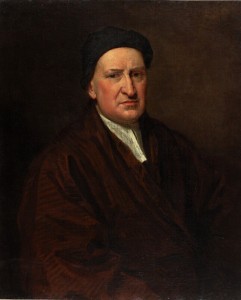
Walter Charleton was born February 2, 1619 and died April 24 1707. In his early years he was educated by his father, Revd. Walter Charleton, but at the age of sixteen he entered Magdalen Hall, Oxford where he studied under John Wilkins. At the age of 22 he earns his medical degree and is appointed physician-in-ordinary to Charles I during his time at Oxford that same year. He remained physician to Charles II during his exile, but remained in London to continue his writing until he continued his post after the restoration.
He is best known as a physician and natural philosopher, but he wrote widely in philosophy and what would become archeology. In his early career, Charleton worked as an assistant to the senior royal physicians: Sir Theodore Turquet De Mayerne and Joan Baptista Van Helmont. Charleton published his first three works in 1650, but two of them were mere translations of Van Helmont’s work, and the last was an exercise following Van Halmont’s methods. These works did, however, give Charleton a reputation as a representative of the new iatrochemistry which looked to Galen as an authority on medical practices. Within two years Charleton would write The Darknes of Atheism Dispelled by Light of Nature, which was purported to be among the earliest works of natural theology. This first original work establishes firm discursive connections to the work of Gassendi, Descartes, and Hobbes, among others. In 1654, Charleton paraphrased Gassendi’s ideas about Epicureanism in English, thereby introducing an alternative philosophical system to Descartes to the Britain.
1659 marked the beginning of Charleton’s publications on physiology with the Oeconomia animalis, in Latin, and Natural History of Nutrition, Life, and Voluntary Motion, in English. Charleton proposes that muscles do not increase in volume when they contract, contrary to the Cartesian belief. Jonathan Goddard proved him correct with an experiment in 1669. All of Charleton’s publications after Natural History, with a few exceptions, focus on human or animal physiology, pathology, or the “passions,” though many of them are presented as exercises in natural theology. In 1659 he publishes The Ephesian Matron: Based on the Tale in the ‘Satyricon’ of Petronius in which he attempts to undermine the prevailing belief in Platonic love and claim that attraction is the result of the desire to procreate. However, he also attempts to gain political favor by publishing Imperfect Portraicture of his Sacred Majesty Charles II, which he revised later that year as A Character of His Most Sacred Majesty Charles the Second.
In 1661 Charleton becomes one of the earliest members of the Royal Society, and is one if its most active members until 1668. Sometime during that year Charleton becomes estranged to William, second Viscount Brouncher, president of the Royal Society during that time. He writes Chorea Gigantum, or The Most Famous Antiquity of Great Britain, Vulgarly Called Stone-heng … Restored to the Danes in 1663 which serves both the Royal Society and to curry favor with Charles II. Charleton argues that Stonehenge is not a Roman structure as Inigo Jones argued, but a Danish structure, built during their occupation of the British Isles. He corresponded with Olaus Wormius who wrote extensively on the subject, though Charleton offers a reasoned critique of his theories.
In 1676 he was admitted to the Royal College of Physicians, where he gave the Harveian Oration in 1680 (a lecture established by William Harvey in 1656). Charleton is appointed to a number of positions during his tenure at the Royal College, though he begins to take time away from London, possibly to the Island of Jersey, or to Nantwich, Cheshire. It is speculated that Charleton exeperinces considerable bouts of depression in his later years, and many of the positions awarded to him late in life at the Royal College were to help a former president through hard times. Charleton died in London in 1707, and while he outlived the currency of his work he blazed a trail for many prominent thinkers.
D. Geoffrey Emerson
Works Cited
Henry, John. ‘Charleton, Walter (1620–1707)’. Oxford Dictionary of National Biography. Oxford University Press, 2004; online edn, Sept 2010 [http://www.oxforddnb.com/view/article/5157, accessed 22 Sept 2014]